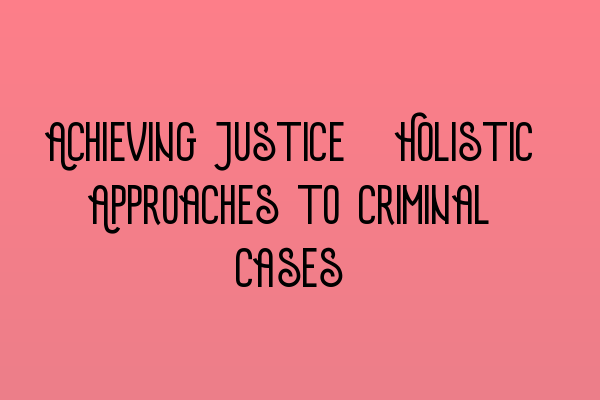Achieving Justice: Holistic Approaches to Criminal Cases
When it comes to criminal cases, achieving justice should always be the primary goal. However, the traditional approach to criminal law may sometimes fall short in ensuring a fair and balanced resolution. In recent years, there has been a growing recognition of the need for holistic approaches in handling criminal cases.
What is a Holistic Approach?
A holistic approach to criminal cases involves looking beyond the surface-level facts and delving deeper into the underlying causes and circumstances surrounding the alleged crime. It recognizes that individual defendants are not isolated incidents but are products of their environment, experiences, and personal circumstances.
By adopting a holistic approach to criminal cases, legal professionals can gain a comprehensive understanding of the defendant’s background, mental health, socioeconomic factors, and any other relevant aspects that may impact their actions. This approach takes into account the whole person and seeks to address the root causes of criminal behavior rather than focusing solely on punitive measures.
The Benefits of Holistic Approaches
By focusing on holistic approaches to criminal cases, the justice system can achieve several significant benefits:
- Effective Rehabilitation: Holistic approaches prioritize rehabilitation over punishment. By addressing the underlying issues that may have contributed to criminal behavior, defendants have a better chance of reintegrating into society as productive citizens.
- Reduced Recidivism: By understanding the root causes of criminal behavior, holistic approaches can significantly reduce the risk of reoffending. Treating the underlying issues rather than just punishing the act itself helps break the cycle of crime.
- Equality and Fairness: Holistic approaches promote fairness and equality in the criminal justice system. They aim to address systemic biases and cultural factors that may disproportionately impact certain individuals or communities.
- Enhanced Community Safety: By addressing the root causes of criminal behavior, holistic approaches can lead to safer communities. By providing support, education, and interventions, individuals have a better chance of overcoming their challenges and avoiding future criminal activities.
Implementing Holistic Approaches
Implementing holistic approaches to criminal cases requires a collaborative effort from various stakeholders, including legal professionals, social workers, psychologists, and community organizations. By working together, they can offer a multi-dimensional support system tailored to the individual’s needs.
It’s important to note that while holistic approaches focus on rehabilitation, they do not undermine the importance of accountability. Criminal acts still carry consequences, but the emphasis is on addressing the underlying issues to prevent future crimes.
Additionally, continuous education and training for legal professionals are crucial for the successful implementation of holistic approaches. By staying up-to-date with the latest research, methodologies, and best practices, they can effectively advocate for their clients and work towards achieving justice.
Conclusion
Adopting holistic approaches to criminal cases allows the justice system to move beyond punitive measures and towards comprehensive solutions that address the root causes of criminal behavior. By taking into account individual circumstances, mental health, and socioeconomic factors, we can work towards achieving a fair and just society.
If you’re interested in learning more about criminal law and legal practice, check out these related articles:
